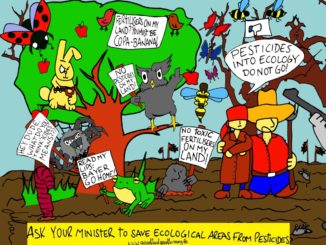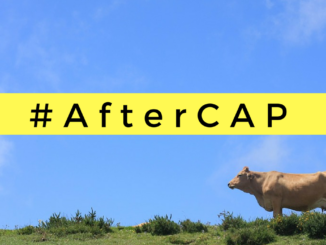Update 12.44 13/10/2017
The Agricultural part of an omnibus regulation has been reached in Estonia, yesterday 12th October. Omnibus regulation adjusts financing for the EU budget in agriculture and other areas. Changes to direct payments, rural development, common market organisation and horizontal regulation have been made in the Common Agricultural Policy. However concerns are being expressed at both the procedures and content of this Omnibus.

The Agricultural part of an omnibus regulation has been reached in Estonia. Omnibus regulation adjusts financing for the EU budget in agriculture and other areas. Changes to direct payments, rural development, common market organisation and horizontal regulation have been made in the Common Agricultural Policy. However concerns are being expressed at both the procedures and content of this Omnibus.
The agreement will have to be confirmed by the Special Committee on Agriculture during the meeting scheduled on Monday, 16 October.
Under the guise of simplification, buffering farmers against risks and farmers’ weak position in the food supply system, what are described as “improvements” have been made: “I am glad to announce an agreement that reflects the position and priorities of the Council: simplification in continuity. In order to thrive, our farmers need to have a set of rules that are simple, effective and workable. Today we agreed on improvements that will make their daily life and the work of national administrations easier”, said Marko Gorban, Chief negotiator, Estonian presidency.
Similar the European Parliament Press Office has described the tentative agreement as providing “simpler and more flexible EU’s farming policy rules”, “stronger farmers in the food supply chain” and “better tools to deal with production and market risks”.
Read background to the Omnibus negotiations
Initial reports suggest that “all recognised farmers’ organisations” will now be “allowed to plan production and negotiate delivery contracts on behalf of its members without falling foul of the EU’s competition rules. Collective negotiations have so far been allowed only for milk, olive oil, beef, cereals and arable crops producers.” The Income Stabilisation Tool (IST), currently poorly implemented, will be will be prioritised; rules for crop, animal and plant insurance, mutual funds will be adjusted, while the IST will allow for increased compensations; public intervention and private storage will be made easier; member states will be allowed employ coupled support for ailing sectors.
The deal also “gives member states more flexibility to define an active farmer, i.e. a person eligible for EU farm subsidies” which would allow for the dropping of all blacklisted categories from 2018. Young farmers’ top-ups could be increased from 25% to 50% of the basic payment. entitlement.
Analysis
Sources backing significant ecological and social change in the CAP, from smaller green and left groups, are livid at what has been referred to as “bulldoze diplomacy”. The Parliament’s position was not objected to for procedural reasons, which now leaves an Omnibus which sources claim complicates rather than simplifies, cedes from common policies unnecessarily to small numbers of member states, while ignoring existing provisions and flexibilities already in the CAP. In this a real opportunity to deal with “pan European issues affecting all Member States or farmers” has been lost, a source said. The source added “the nature of the inter institutional negotiations does not allow for much scrutiny, especially by civil society.” This push by some MEPs prominent in supporting business-as-usual in agri-food was seen as regressive and opportunistic.
Specific concerns raised by Sources ARC has communicated with include:
Rural Development regulation
Concerns have been raised that changes here to allow more lenient irrigation rules will allow water extraction from one watercourse without the condition that surrounding watercourses in the water catchment or drainage basin are in good condition. This impacts all neighbouring farmers, all neighbouring users of water and sensitive areas such as wetlands. It is especially foolhardy in a context of extreme weather conditions – floods, droughts – becoming ever more frequent.
Risk Management
Concerns were also expressed that expanding risk management can be considered a giveaway to insurance companies and financial services, from rural development budgets and, equally importantly, from the impetus to make real changes in practices. Non resilient practices such as inappropriate cropping, leaving soil uncovered, not improving soil humus, year on year monocultures can be continued unchallenged which also leave them increasingly susceptible to extreme weather like floods and droughts. With extreme weather events impacting on yield, it is likely that yet more resources will be siphoned away from rural development and towards insurance and financial services than currently predicted. There are also concerns regarding IST making changes from coverage per farm to coverage by crop/sector, which are likely to be challenged at WHO level. With few member states actually using insurance, and fewer again using income stabilisation tools, opening up the basic legislation, especially given the risk of damaging proper rural development, is foolhardy.
Direct Payments Regulation
More positive reactions emerged from sources here: the potential for expanding what can be considered as grazable and therefore eligible for payment, could allow for rough grazing in upland areas currently considered ineligible. And despite its weakness, positive soundings were made with regard to the plans for increasing EU protein crops. There were concerns expressed at the opening up of the definition of the active farmer, as the blacklist includes many non farming entities.




